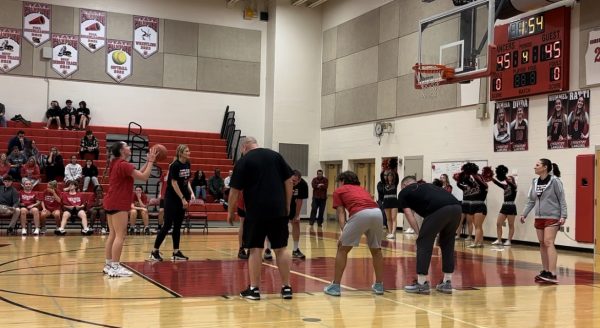Check in with yourself: We need mental health days alongside sick days
Sometimes, your mental battery is drained and leading a normal day does not seem to be the right thing to do.
The alarm clock rings. Snooze it. It rings again, a quick 10 minutes later. No cough, no fever, just a general “I can’t do this today,” and that’s okay. It’s okay to take a break for mental health.
May is National Mental Health Awareness Month. While we might be aware of the term “mental health,” we might not be entirely aware of our individual mental health. Not many people check in with themselves, but it is important.
Right now, if a student or a staff member were to wake up and not feel like they could push through the day because their mental health is not at 100%, they would still feel they need to go to school.
There are physical sick days that we are all familiar with. If someone has a cold, a fever, or anything of the sort, a parent emails in for the child to stay home. For a teacher, they would get a substitute for the class. But, there are no days available when we don’t feel well because of our mental health.
The reason that mental health days are not available to students and staff is not because it’s not possible, and definitely not because mental health is not an issue among children and teens.
According to the CDC, “Ever having been diagnosed with either anxiety or depression among children aged 6–17 years increased from 5.4% in 2003 to 8% in 2007 and to 8.4% in 2011–2012.” This goes to show that mental health is growing in school-aged children.
As the Supervisor of Psychological Services in Frederick County Public Schools, Ann McGreevy has a clear vantage point of mental health struggles, needs, and details in school aged children.
McGreevy said, “Mental health disorders are the most common diseases of childhood. Half (50%) of all mental health disorders occur before the age of 14 and 75% occur before the age of 24. Suicide is now the second leading cause of death for children and adolescents. Given this huge impact on children and adolescents, I think that mental health issues, including feeling overwhelmed or exhausted mentally are important issues in schools for both students and staff.”
There is overwhelming data to show that school-aged children are vulnerable to mental health struggles. For the different ages, elementary, middle, and high school students, mental health struggles can show up at different times, and can present itself in different ways.
“Students in elementary, middle school and high school are all at different developmental levels, so the way we support their mental health may be different but their need for mental health support is equal. Early intervention and prevention can have very positive effects on the number of people who suffer from mental illness later in life. There is overwhelming research demonstrating this,” McGreevy said.
Freshman Matthew Hauptman said, “Schools just kind of overwhelm kids with work, and it can be hard to mix that with a life outside of school, like sports.”
While having work is part of being in school, it can get really stressful when you have several other things that you like to try and participate in. It’s hard to mix in the pleasurable activities that balance out work and life, school and extracurriculars.
“I just do a lot of sports and hang out with friends, and that helps get school off my mind,” Hauptman said.
Science teacher Mrs. Amber McCauley works hard to find a balance.
“Like everyone, I’m trying to balance. I plan ahead, I have breaks within my day to do things I enjoy. I make sure I get enough sleep. I take walks,” McCauley said.
From a teacher’s perspective, it can be like looking over the students, and seeing what happens from a distance. Although, this can come with it’s challenges. When does the teacher intervene, and is it really necessary?
McCauley said, “We do have students who come to school exhausted. This can be for many reasons, and students pushing themselves academically can be one of those reasons. As a teacher, it’s sometimes difficult to determine which issue is actually causing the exhaustion.”
Is there really a need for mental health days to be separately recognized? We already have sick days. Why can’t a student or staff member use one of those days to take care of their mental health?
We all need mental health days. I think sometimes people take them without really calling them that. I have seen instances when a student is just overwhelmed and needs to mentally check out, and I believe the best thing I could do for that student is to give them that day. — Mr. Hawkins
Part of having mental health days in schools would be to destigmatize the idea of mental health. The more we normalize the struggles, the more comfortable teens and pre-teen children will be to take a break due to a mental health struggle; the more comfortable the individual could be with reaching out for help.
This could also boost the possibility for some students to take a day to themselves. Some home-situations don’t leave room for students to take a day to reset, or some students might feel guilt for slowing down. Showing that schools support and allow the idea of taking a break could open up opportunities for these students. Part of showing this support could even be a counselor call home, to check in and make sure everything is okay when taking this mental health day.
A bill passed in Utah and in Oregon that allows students to take a day off for their mental health. This bill got passed through the legislature with the help of its sponsor, Rep. Mike Winder.
“The bill is so important because just as everyone has physical health they need to take care of, we also have mental health we need to take care of,” Winder said.
The biggest challenge among teachers, parents, and even some students when it comes to the possibility of mental health days is if students will abuse the opportunity. Although, with the proper wording and rules aligning with mental health days, there will be no room for students to use these days for anything but what they are intended for.
Winder said, “Some people feel that students would abuse this, but the reality is that they still have to have their parents excuse them and they still have to make up any work missed.”
There is only one true way for students to abuse this day: running from their problems. Everybody has a fight or flight response, and for most things mental health related, the first human reaction is usually flight.
“However, it’s important to think about the timing of the break because the work is still waiting for you when you come back. In fact, sometimes it’s more work because you have to catch up. It’s a balance,” McCauley said.
Running away from problems doesn’t make them go away. If a student were to be stressed out because of school work, or be anxious because of a social situation, there should not be room for them to take this day off. The stress, the anxiety, and the problem itself will all still be there when you walk back into the school doors the next day.
There are no laws, rules, or people other than yourself that can tell you not to run from any problems. It has to be recognized that when there is a mental health struggle that can’t be escaped, the mental health day will be wanted back.
Somedays you just can’t help but feel mentally exhausted, and for that reason you could have a mental health day for regaining your balance. You’ve got this.
Your donation will support the student journalists of Linganore High School. Your contribution will allow us to purchase camera/recording equipment and cover our annual website hosting costs. We hope to raise enough money to re-start a monthly printed issue of our paper.


















